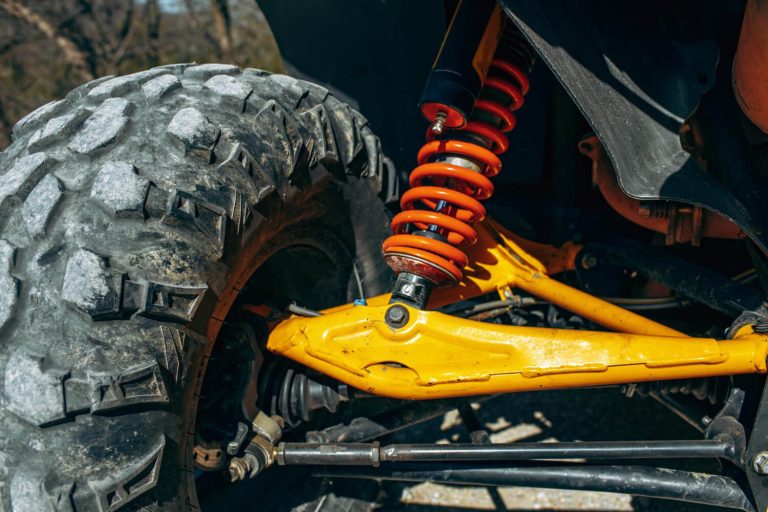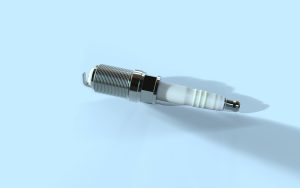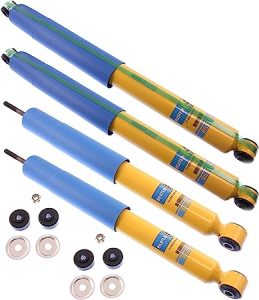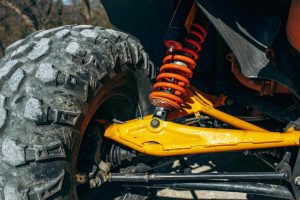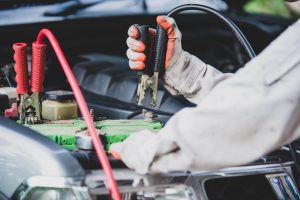Coilovers are the ultimate upgrade for car enthusiasts who love to push their vehicles to the limit. Drivers may modify their rides for the best possible speed, handling, and comfort thanks to these suspension systems’ unrivaled performance and versatility. Like every other component of a high-performance car, coilovers have a limited lifespan. Therefore it’s critical to understand this before making an investment decision. So continue reading if you’re interested in How Long do Coilovers Last.
Table of Contents
ToggleWhat Are Coilovers
Coilovers are a type of suspension that uses coil springs and shock absorbers to improve a vehicle’s ride quality and handling. They are often used in performance applications where lowering the ride height is desired. They can last many years if correctly maintained, but like any other suspension component, they will eventually need to be replaced.
How Long do Coilovers Last?
“How long do they last?” is one of the most frequently asked queries in regard to coilovers. Various factors, including the caliber of the product, driving practices, and maintenance standards, influence the lifespan of a coil-over. High-quality coilovers must be reconditioned or replaced every 50,000 to 100,000 kilometers. However, if you are a particularly aggressive driver or live in an area with harsh weather conditions, your coilovers may only last for a while.
It’s critical to carry out routine maintenance on your coilovers if you want to maximize their lifespan. It involves routinely cleaning and lubricating them to avoid corrosion and keep them working smoothly. A professional inspection of your coilovers at least once a year is also recommended to ensure they are in good functioning order.
By following these simple tips, you can extend the lifespan of your coilovers and enjoy their benefits for many years.
What Factors Affect the Lifespan of Coilovers?
There are a few factors that affect the lifespan of coilovers. The first is how often they are used. Using your coilovers daily will not last as long as using them occasionally. The second factor is the quality of the coilovers. Some brands last less time than others. Researching and reading reviews before purchasing coil overs is essential to ensure you are getting a quality product. The third factor is how well you maintain your coil overs.
Regularly cleaning and inspecting them for damage will help extend their life. The environment in which you use your coil overs can also affect their lifespan. If you live in an area with a lot of salt or sand, for example, it will shorten the life of your coil overs due to corrosion.
Maintenance Tips for Extending the Life of Coilovers
Coilovers are a great addition to any vehicle, but like any other part, they will eventually need to be replaced. Here are some tips to help extend the life of your coil overs:
- Inspect them regularly: Check for any leaks or damage that may have occurred.
- Clean them regularly: Keep them free of dirt and debris to prevent premature wear.
- Avoid extreme conditions: If you can, avoid driving in extremely hot or cold weather, as this can shorten the lifespan of your coil overs.
- Avoid bottoming out: Keep the suspension from bottoming out when hitting bumps or potholes. It will help ensure that your coil overs don’t get damaged.
- Use Anti-Seize Lubricant: Always use Anti-Seize Lubricant to lubricate coil overs after driving on wet roads or after a car wash to prevent rusting and hardening.
- Use high-quality parts: Ensure you use high-quality replacement parts when servicing your coil overs. Low-quality parts can cause premature wear and failure.
- Check alignment regularly: Regularly check your vehicle’s alignment to ensure it is not putting any extra strain on your coil overs.
- Follow the manufacturer’s instructions: Ensure you always follow the manufacturer’s instructions when working on your coil overs. It will help ensure they are correctly serviced and last as long as possible.
Also Read: Temporary Fix For Stuck Brake Caliper
When Should You Replace Your Coilovers?
If your coil overs are leaking, making noise, or riding rough, then it’s time to replace them. Generally speaking, coil overs should be replaced every 50,000 miles or so. However, this varies depending on the quality of the coil overs and how well you maintain them.
Signs of Faulty Coilovers
If you’re noticing any of the following signs, your coil overs are likely starting to fail:
- Your car is bouncy or feels like it’s bottoming out.
- You hear strange noises from your suspension, like creaking or popping sounds.
- Your car is leaning to one side or the other, even when you’re driving on a level surface.
- Your car feels unstable or “floaty” when cornering or making other sudden movements.
- Your wheels are visibly tilted, showing that the suspension is being affected

Conclusion
Coilovers can significantly improve your car’s performance and give it an extra bit of style. However, as with any vehicle part, they have a lifespan and will need replacing eventually. The good news is that coil overs may last many years with proper care and maintenance. So, if you want to get the most out of your coilover setup, give them the care they need. With this information, we hope you feel more confident investing in quality coilover parts for your vehicle!
Frequently Asked Questions
Can I install coilovers on any vehicle?
Yes, coilovers can install on any car, but there are a few considerations to keep in mind when installing coilovers on any car. Coilovers will first lower your car, so decide how far you want to lower it before you get them. Second, coilovers will stiffen your ride, so if you want a softer ride, other options may be available. If you feel uncomfortable installing coilovers since they can be challenging, you might take your car to a mechanic.
Are coilovers more durable than stock suspensions?
Coilovers are often more durable than stock suspensions for a variety of reasons. First, coilovers are made to be adjustable so that you can adjust coilovers them to your unique driving requirements. It implies that you can alter their stiffness to suit your preferences. Second, coilovers use high-quality materials designed to withstand the rigors of track use. Coilovers are often lighter than stock suspensions, which helps to improve handling and performance.
Are there any risks associated with using worn-out coilovers?
As with any mechanical component, there are risks associated with using coilovers that are worn out. The most common risk is that the coil-overs will fail, which can lead to losing control of the vehicle. In extreme cases, this can result in a crash. Other risks include a decrease in performance and an increase in noise levels
Can coilovers be rebuilt or repaired?
If you’re thinking about coilovers, you’re probably wondering if they can be rebuilt or repaired. The answer is yes! Coil-overs can be rebuilt or repaired if they are damaged or worn out. However, it is essential to note that not all coil-overs are created equal. Some coil-overs are designed to be rebuilt, while others are not. It’s best to seek professional advice before doing any repairs if you have questions about whether or not your coil-overs can be rebuilt.
Can coilovers Lift a Car?
Yes, Coil-overs are a suspension used to lower or raise a car. Most coil-overs have adjustable spring perches so you can fine-tune your car’s ride height. This means that you can use coil-overs to lift or lower your vehicle.
If you want to use coil-overs to lift your car, there are a few things you need to keep in mind. First, you must ensure that the coil-overs you purchase are designed for lifting. Some brands make specific “lift” versions of their coil-overs. Second, you must be aware of your car’s maximum safe lifting height. This is typically about 2 inches for most cars. Any more than this and you risk damaging your suspension or even causing your vehicle to tip over.
When lifting your car with coil-overs, it’s essential to raise all four wheels evenly. It will help prevent uneven wear on your tires and ensure your car handles correctly.

